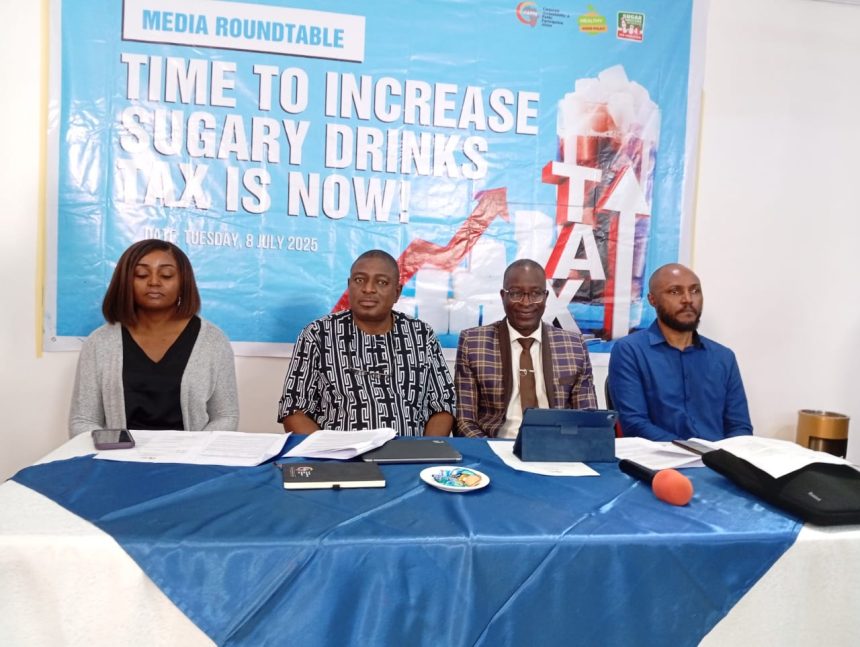By Chidi Ugwu
The Corporate Accountability and Public Participation Africa (CAPPA) on Tuesday called on the Federal Government to raise the tax on Sugar-Sweetened Beverages (SSBs) from the current ₦10 per litre to at least ₦130 per litre.
CAPPA, at a press briefing in Abuja, argued that this significant increase is necessary to reduce the rising consumption of sugary drinks, which are linked to the growing burden of non-communicable diseases (NCDs) such as diabetes, heart disease, and obesity in Nigeria.
Addressing media practitioners and public health advocates at a roundtable in Abuja, Akinbode Oluwafemi, CAPPA’s Executive Director, highlighted that Nigeria loses over ₦200 billion annually due to the low SSB tax, which fails to deter consumption or generate adequate public health revenue.
He described the situation as a “ticking time bomb”, highlighting that non-communicable diseases (NCDs) such as diabetes, hypertension, stroke, heart disease, and obesity—once rare in Nigeria—are now widespread, claiming the lives of young and old alike and draining family savings.
“NCDs now account for 1 in 3 deaths in Nigeria. They are no longer the diseases of the rich or the elderly; they are aggressively decimating our workforce, destabilising families, and undermining national productivity,” Oluwafemi stated.
According to him, a recent investigation revealed that Nigerians spend an estimated ₦1.92 trillion ($1.26 billion) annually on healthcare related to these preventable conditions, pushing many families into poverty.
Independent reports that in 2021, Nigeria introduced a ₦10 per litre excise duty on non-alcoholic, sweetened, and carbonated drinks.
However, CAPPA argued this tax is grossly inadequate. At current market prices, the tax represents just 1% of the retail price, far below the 20–50% increase recommended by global health authorities to meaningfully deter consumption.
“The current tax is barely a nudge, let alone a deterrent. Without a significant price impact, we cannot expect meaningful changes in consumption,” Oluwafemi emphasized.
CAPPA boss warned of deliberate industry efforts to mislabel the SSB tax as a “sugar tax” to confuse the public and weaken support, and also expressed alarm over Nigeria’s growing role as a dumping ground for unregulated sugary drinks, citing recent incidents at the 2025 Food and Beverage West Africa exhibition where foreign drinks without proper labels were freely marketed.
He called for mandatory front-of-pack labelling to ensure Nigerians know what they are consuming, outlining a series of urgent recommendations include: “Increase the SSB tax to raise retail prices by at least 20–30%, ideally 60%, in line with WHO guidelines. Specifically, CAPPA urges raising the tax from ₦10 to at least ₦130 per litre.
“Earmark tax revenue for healthcare, NCD prevention, nutrition education, and school feeding programmes.
“Mandate transparent labelling on all food and beverage products.
“Require annual public reporting by tax and health authorities to ensure accountability.
“Establish strong protections against industry interference in policy-making and Invest in food security and agroecology to reduce dependence on ultra-processed foods”.
Continuing, Oluwafemi urged the Federal Government to act decisively, stressing: “Nigeria cannot afford the cost of delay. A stronger SSB tax will save lives, ease the pressure on our fragile health system, and generate much-needed revenue to build a healthier, more prosperous nation. Let us choose health over profit. Let us choose the future over the past.”
In his presentation, Dr. Joseph Ekiyor, declared that in 2021, non-communicable diseases (NCDs) were the leading cause of death and disability globally, responsible for approximately 43 million deaths, which represents 75% of all non-pandemic-related deaths worldwide.
The alarming statistic underscores the significant burden NCDs place on global health systems.
It was gathered that among these deaths, 18 million occurred in individuals younger than 70 years, with 82% of these premature deaths happening in low- and middle-income countries, highlighting the disproportionate impact on these regions.
The major contributors to NCD mortality include cardiovascular diseases (about 19 million deaths), cancers (10 million), chronic respiratory diseases (4 million), and diabetes (over 2 million). Together, these four groups account for 80% of all premature NCD deaths.












